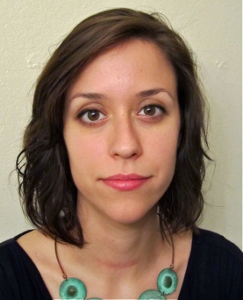
Flesh of My Flesh
Contributor’s Marginalia: Rochelle Hurt on “The Clinic Bomber’s Mother” by Shara Lessley
This is now bone of my bones, and flesh of my flesh: she shall be called Woman
–Genesis 2:23
On its surface, Shara Lessley’s “The Clinic Bomber’s Mother” is a carefully built character sketch in sonnet form. In fourteen sonically rich lines, Lessley describes the minutiae of post-tragedy life for her subject, a mother dealing with grief and staving off guilt: “Keep/his photos on the mantel, his boyhood/room the same. Bring daisies to his plot,/ignore the other graves.” It is through these small details, however, that Lessley’s multi-layered themes are revealed—most notably, the convergence of motherhood and religious symbolism.
Throughout the poem, images of death and the body creep into the mundane domestic scenes typically associated with motherhood: between coffee, photos, daisies, linens, and towels, we see gravesites and blood, now a part of this mother’s routine: “She donates blood, is comforted/that strangers wear his clothes.” When the clinic bomber’s mother visits a confessional booth, she tells the priest, “the bathroom hook still holds/his towel,” admitting more than her inability to clean up. The enjambed break on “holds” in this instance movingly underscores her lingering maternal impulse to protect her already-gone son, whose absence haunts the poem, and her inability to fully come to grips with what he has done. They seem to be at odds—accepting the reality of her son’s heinous acts and grieving the loss of him.
Her approach to this problem is to attempt amends with the world through good deeds, and in this way she becomes a kind of Christ-figure, responsible for the absolution of her son’s sins. Lessley draws this comparison through several religiously charged phrases and images. In the first stanza, for example, it is the mother’s duty to “walk among the living” in order to keep up appearances. Later, she helps the poor by donating clothes and, in the poem’s most genius symbolic act, her own blood—a means of washing away the sins of her son and perhaps replacing the blood spilled by him. We know that, to some degree, she will be blamed—her mothering called into question—nonetheless. In an interesting reversal then, the parent (and not the son) becomes the sacrificial lamb, offering herself up as a conduit for forgiveness.
The poem’s final couplet enacts a devastating turn on this point: “There’s little time to think or rest./More and more, the wafer tastes like flesh.” While this sensation technically mimics transubstantiation, in which bread and wine become the flesh and blood of Christ, the couplet’s slant rhyme, which stands out from the rest of the poem’s unrhymed lines, falls heavy on the ear and reminds readers of the son’s violence even amidst the mother’s progress toward healing. In this way, it feels almost like reversal of absolution—as if, through her self-assigned acts of contrition, the transference of sins to her body continues and her guilt only increases.
Lessley’s decision to focus on the clinic bomber’s mother (rather than the bomber himself or his victims) is surprising and significant in several ways. Think of the parallels between the Christ story and maternity: how a mother’s body is transferred in cell form to her child, how a mother’s flesh splits itself open for another, how a mother’s blood is shed in birthing new life. I’m struck by the subtle and subversive irony of this. One might assume, given the current political context, that the clinic bombed was an abortion clinic—a space in service of women and devoted to reproductive health and agency. How much more tragic and admirable then is the mother’s plight in this poem—and how powerful her maternal role.
